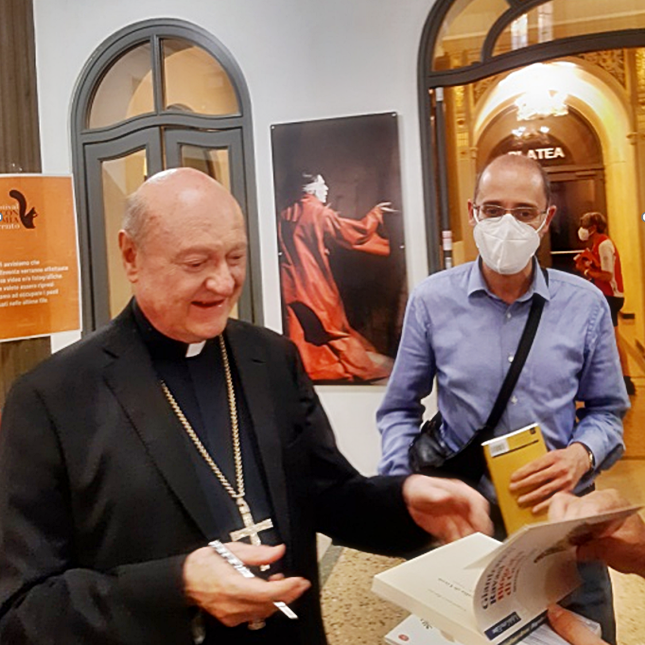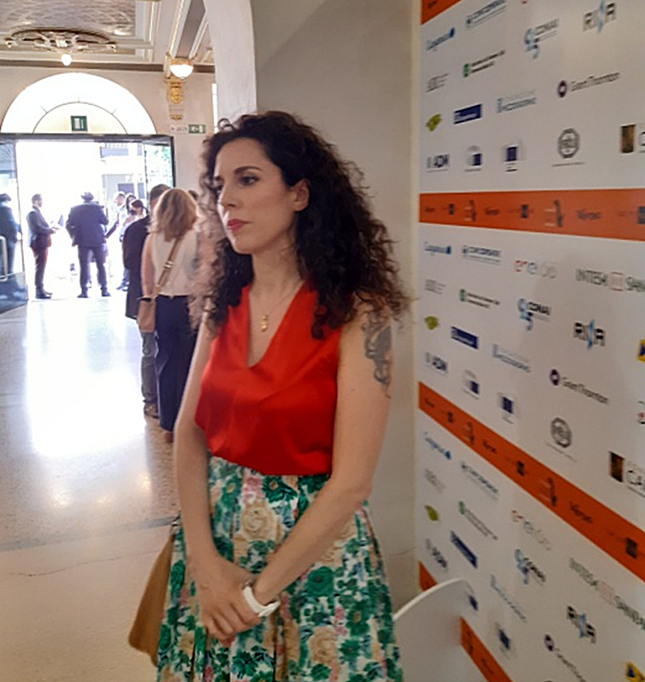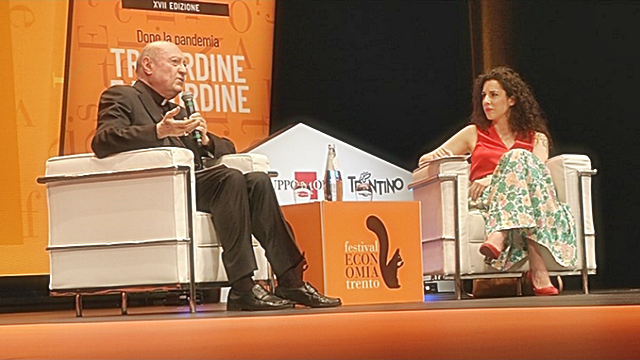Rewind the ribbon of the 17th edition festival, not to draw conclusions, but to make the protagonists’ thoughts known
>
The closure of the Festival of Economics, in the new management of the Sole 24 ORE, confirms the original idea of this event, which has attracted interests from many sides and a large participation of young people.
We cannot dwell only on the numbers, but recognize that the good organization, the collaboration between the Autonomous Province of Trento, the University, the Municipality of Trento and the 24 ORE Group has generated considerable success not only for the capital, but also for the entire Trentino area.
To enter the contents of this event, which transmits knowledge of economic culture, I decided to focus on the first meeting, which I attended and which may intrigue readers due to the depth of the speakers and the topics covered.
In the inaugural ceremony, Cardinal Gianfranco Ravasi, President of the Pontifical Council for Culture and Silvia Avallone, lay writer, met with a simple but very profound dialogue.
A conversation between different realities, cultures and roles, and different life experiences.
The questions posed by the Piedmontese, but partly also Tuscan, writer on the theme: “Ethics and spirituality, sources of a philosophy of development in a current society that goes towards emptiness, nothingness” are the result of a vast and profound preparation, a reasoning on the mysteries of the world explained in an attractive way.
The possibilities of meeting people who think differently, can make unprecedented situations flourish, new realities of real life, both in the world of work and in Italian industrial areas and in other areas.
Writing stories of individual, subjective communities is passing from an idea of us and others, far from widespread individualism, is reconstructing a new way of being a community through listening.
There can be no prosperity and future if we do not also deal with the social, without exclusions.
Encounters can generate new ideas, new projects, new explorations.

According to the interviewer, courage is important because it passes through ideas. Culture must excite, be an opportunity for dialogue, for confrontation with a philosophy of development; because we no longer live with a single culture, but with a set of cultures.
Avallone continued his opinions by clarifying that today we live in a very particular and complicated era.
We think of the new technologies, information technology, the transformations that have taken place in society, the strong and fast changes, noting that “life cannot be a means to win as the big media say; within this education we are alone.
“The emptiness, the absence often perceived not as a starting point, on which to question oneself, but as indifference.”
The voids define understanding, experiencing.
We must encounter a story because it is the story of each one that triggers freedom.
We have to become ourselves, through the knowledge of others.
Building a fairer, more supportive community must remain our goal. Believing in culture is important to avoid gaps, for example in novels, in classic stories, we find those who lose and then redeem themselves.
From this being vulnerable comes our ability to feel in tune with others.
Cardinal Ravasi, after having expressed his appreciation of the author’s books, asked those present two questions: do we all share the same concept of human nature? Do we all have the same concept of truth?
Today the noble thought of culture is outdated, but we need to return to culture, rediscover it in its actuality.
The lack of amazement in current events is not just a novelty.
He then spoke of what unites: philosophy, ethics and spirituality. The prospect that presents itself for the future is to define not only people’s skin, but also what is on this skin, which can be the divine, the believer and on the other hand it can be that mystery of being that there is. surrounds.
The world will perish for lack of wonder and therefore of amazement, of the sense of desire.

Now we live in a period of anorexia of ends and bulimia of means, but at the same time little is asked about the meaning of life.
He then cited the thinking of some important historical thinkers for their testimonies.
He then continued in his deepening, explaining that religion, like art, serves only the meaning of life.
Culture is important, it is an important characteristic of being, just as its dimension is fundamental, which leads to the immense plain of truth, in search of truth.
Today the concept of truth is more changeable, more varied. Society has fallen into the abyss of emptiness, it no longer has desire, it no longer has in mind the question of God, of good, of evil, which are not absences, but empty. Culture must try to fill the void. It must give the warmth of presence.
We must try to plant a seed in the void, even if the soil is desert.
Finally, he recalled a poem by the Friulian theologian and philosopher David Maria Turoldo. It is a writing to his atheist brother, who is depicted as follows:
“Nobly thoughtful atheist brother, in search of a God that I do not know how to give you. Let’s cross the desert together. From desert to desert we go beyond the forest of faiths, free and naked towards the naked Being and where the Word dies our journey ends.. “
In conclusion, the scholar and biblical scholar, who collaborates with the newspaper il Sole 24 ORE and l’Avvenire, focused on the importance of creating paths based on redemption and rebirth, as movement actions for humanity, where priority is recover the dialogue.
A description that walks the crest between faith and history, between ethics and spirituality.
In difficult and complex moments like the present ones, it is important and fruitful to mix languages, opinions, to ensure that culture becomes an opportunity for dialogue, for openness, the basis for a new descriptive channel.
And as they say, after all, every person who participated in this meeting, from the exhibitions of the two speakers has certainly brought home something to rediscover the hope and strength to make their own contribution to the rebirth of our Trentino land too. .
| Gianfranco Ravasi | Silvia Avallone |
| Biography of Jesus According to the Gospels | A friendship |
| Ed. Raffaello Cortina 2021 | Ed. Rizzoli 2020 |
Curated by Maurizio D. Bornancin
© All rights reserved
Ravasi and Avallone at the Festival of Economics – By M. Bornancin

